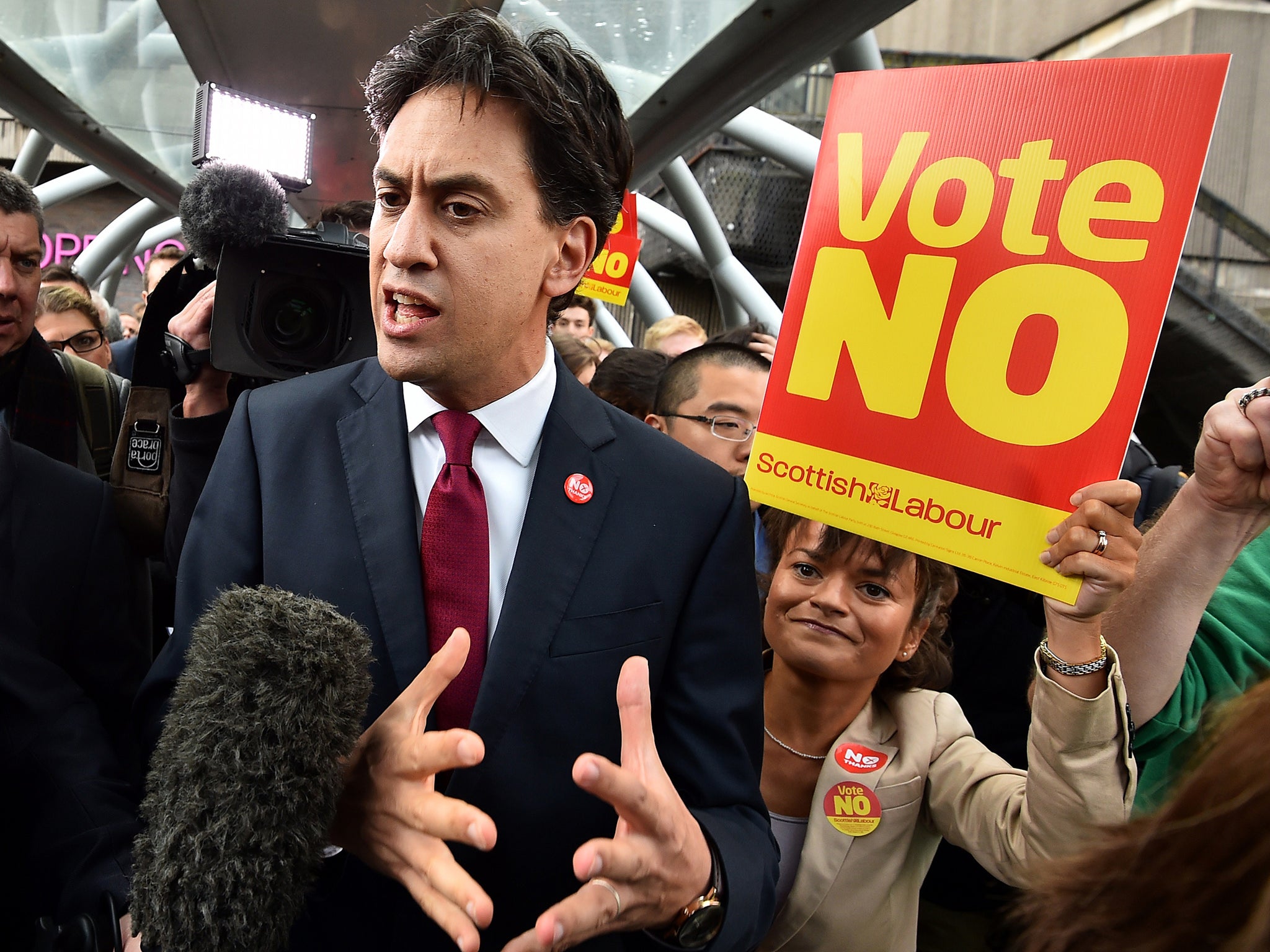Scottish independence: What would happen to Labour if Scotland votes Yes?
Would Miliband have to go? Would Labour ever be able to win a majority?

Your support helps us to tell the story
From reproductive rights to climate change to Big Tech, The Independent is on the ground when the story is developing. Whether it's investigating the financials of Elon Musk's pro-Trump PAC or producing our latest documentary, 'The A Word', which shines a light on the American women fighting for reproductive rights, we know how important it is to parse out the facts from the messaging.
At such a critical moment in US history, we need reporters on the ground. Your donation allows us to keep sending journalists to speak to both sides of the story.
The Independent is trusted by Americans across the entire political spectrum. And unlike many other quality news outlets, we choose not to lock Americans out of our reporting and analysis with paywalls. We believe quality journalism should be available to everyone, paid for by those who can afford it.
Your support makes all the difference.In the short term, David Cameron would have most to lose if Scotland votes to leave the UK tomorrow. Some Conservative MPs believe he could even lose his job.
Yet in the medium term, a Yes verdict could have a much more dramatic impact on Labour than the Tories. It currently holds 41 of Scotland’s 59 constituencies – which would no longer send MPs to Westminster after “independence day”, which is due to happen in March 2016 on Alex Salmond’s timetable.
In public, Labour insists all its efforts are being put into securing a No vote tomorrow. In private, Labour MPs fret about their party’s future - and their own. Occasionally, glimpses emerge. Gordon Brown suggested last week that he might stand for the Scottish Parliament to expose what he called the SNP’s “lies” about the NHS. Today Alistair Darling, leader of the Better Together campaign, made clear his political future would lie in Scotland whatever the outcome.
In their darkest moments, some Labour insiders ask themselves whether a Scottish breakaway would mean the death of their party as we now know it, reflecting that it would be very difficult to win power at Westminster without its solid block of Scottish MPs.
Others are less gloomy. They point out that only four of the 18 general elections since 1945 would have had a different result if Scotland had been excluded. In 1964, when Labour won a majority, the Tories would have been the largest party but without a majority. In February 1974, the Tories, rather than Labour, would have been the largest party. In October 1974, Labour would have been the largest party but without the majority it won. In 2010, Mr Cameron would have secured an overall majority and would not have needed to form the Coalition with the Liberal Democrats.
One nightmare scenario for Labour is that it wins a majority at next May’s general election which would disappear when Scottish MPs no longer sat at Westminster. It is a very real prospect: The Independent’s latest poll of polls points to it. Would Labour soldier on as a minority government, seek a coalition with the Lib Dems or seek another general election? We don’t know.
Senior Labour figures admit the internal balance of forces within the party would change if Scotland leaves the Union. Some believe Ed Miliband’s left-of-centre appeal would never “win” England. This charge dismissed as “rubbish” by his allies, who insist that his pitch to the “squeezed middle” resonates in all parts of Britain.
Tony Blair’s obsession with Middle England meant he would still have won his three general election victories even without Labour’s Scottish block – including two with majorities of more than 100.
Blairites do not want the UK to break apart, but if it happened they would sense an opportunity to regain their party’s levers of power. Those who voted for David Miliband in 2010, when he lost to his brother by a whisker, would feel vindicated. But he would be unlikely to return from his self-imposed exile in New York. It would be a difficult message for any party to say “we picked the wrong brother”.
Even a No vote would pose problems for Labour. If Scottish MPs were excluded from voting on “English laws”, as Tory MPs are already demanding, some Labour folk worry whether a Labour government would ever get a Budget approved by the Commons. Whatever the result, nothing in politics is going to be the same.
Join our commenting forum
Join thought-provoking conversations, follow other Independent readers and see their replies
Comments